Sound and silence
Alex Ross's The rest is noise is one of those books that regularly turns up on music reading lists. It made just about every major non-fiction shortlist in the year that it was published, won the Guardian's First Book Award (hardly surprising as the then editor, Alan Rusbridger, is a keen amateur musician), was shortlisted for the Pulitzer Prize for general non-fiction, and was one of the New York Times' 10 best books for 2007.
Ross is a music critic for the New Yorker magazine, and The rest is noise is a glorious romp through the Art music of the twentieth century, and its crossover into the world of popular music. I found it rather heartening that unlike many gloomier critics, Ross, by and large, sees classical music as being still gloriously alive, albeit having influences in some sometimes unexpected places. He has a fascinating perspective looking at the difference between the way modern art or literature is perceived by the wider public, and music. Twentieth-century art music is often viewed as seriously scary, needing a high level of musical knowledge, or just plain weird, while art and literature generally seems to have been embraced.
Ross gently guides the reader through the 2nd Viennese School, Mahler and Strauss, the turbulent history of the twentieth century and its impact on the music of the period. There are some delightful surprises here, a nervous George Gershwin playing for Alban Berg - would his music be considered good enough? "Mr. Gershwin," says Berg, "music is music." While Stravinsky was so entranced when Charlie Parker played a quote from one of his works in the middle of an improvisation that he spilled his drink.
There's also a wonderful evocation of a party thrown by Harpo Marx at which Fanny Brice asked Schoenberg to "play us a tune". (Schoenberg also regularly played tennis with Charlie Chaplin and the Gershwins). Another lovely Schoenberg story was a memoir from his son's childhood "....tour buses would regularly come up the street, and a voice on a loudspeaker would point out the home of Shirley Temple. The guide would never mention that the composer of Erwartung lived across the way. "My father was always a little sad about that....but another time, we stopped at a juice bar out on Highway 1, and the radio was playing Verklarte Nacht, and I never saw him so happy.""
There are the struggles of composers to find their own voice, often against extremely difficult backgrounds from the brave composers of Theresienstadt to Sibelius' struggles with alcohol, and Prokofiev and Shostakovich's work in a totalitarian state. Then there are the exiles, Rachmaninov, Schoenberg and Stravinsky all living near other in Beverley Hills. Ross explains how music became caught up in the Cold War, and how composers looked for other ways to develop music.
It's a complicated story, not least because the music of the twentieth century was written at a particularly complex time. It's not that the music of this era is more complicated in construction than anything that has gone before, but in its sheer diversity it is very different from any previous era. As such Art music feeds into pop and rock music, rock and folk music into art music, and so on. People who are convinced they hate "classical" music, will happily listen to downloads of film music, most of which is essentially based on Art music, without realising that is actually what they're listening to.
I didn't agree with everything that Ross says in his book. I think especially in regard to music in the United Kingdom, he does have a rather rose-tinted view. Yes, it is true that Britten, Elgar and Vaughan Williams are fairly frequently featured on concert platforms and on Radio 3. But for many more minor composers, it is much more difficult to get a regular airing, and for the avant garde it is often virtually impossible. Bums on seats continue to be the most important thing to concert promoters, and lesser known British music is one of the casualties of this.
A good example of this is to look at the Proms; a regular feature of British musical life since the late nineteenth century. I had a look at 2 Proms seasons - 1947 and 2017. In 1947 around 23% of all the music played at the Proms were by British composers, in 2017 this had dropped to just under 22%. The drop itself may seem insignificant, but there's more to this than first appears.
Programming was rather different then, and 1947's programmes often consisted of shorter works. The one really good thing about this, though, was that there was a wide variety of music. Out of 49 Promenade concerts in the '47 series, at least 33 featured music by British composers. You still got all the old favourites - Beethoven and Brahms and Haydn (and a lot of Wagner!), but there was a slice of British musical life included in most concerts. Very important if you're a young aspiring composer.
This year's Proms was very diverse - there was world music (great), musicals, jazz and pop, and film music, as well as your standard classical fare. But out of around 83 concerts (this included Proms taking place outside London), only 28 featured music by British composers. So overall you were 33% more likely to hear British music at a random Proms concert in 1947 than in 2017, a huge move. The BBC undoubtedly deserves praise for its sponsorship of young musicians, for its classical music programming (Radio 3 drives me mad sometimes, but I still appreciate the wealth of music it has introduced me to), and for the commissioning of new works; but concert programming generally still remains a difficult area for performing less than mainstream works. This is especially true of concert hall programming.
But back to Ross. Classical music may have a bit of a rocky future, but what really stays with you after reading The rest is noise is the sheer enjoyment that music gives. Ross's own enthusiasm for his subject vibrates off the page. I loved the book - the history behind it, the memoirs, the "I never knew that" moments, and most of all for such a wonderful broad exploration of a musical century in which music exploded in every direction. I loved the philosophy behind the music, and Ross's philosophy as a music critic. It's an inspiring, enjoyable read, and if it doesn't get you listening to a wider variety of 20th century music, I don't know what will. A fabulous entrancing read.
Ross is a music critic for the New Yorker magazine, and The rest is noise is a glorious romp through the Art music of the twentieth century, and its crossover into the world of popular music. I found it rather heartening that unlike many gloomier critics, Ross, by and large, sees classical music as being still gloriously alive, albeit having influences in some sometimes unexpected places. He has a fascinating perspective looking at the difference between the way modern art or literature is perceived by the wider public, and music. Twentieth-century art music is often viewed as seriously scary, needing a high level of musical knowledge, or just plain weird, while art and literature generally seems to have been embraced.
There's also a wonderful evocation of a party thrown by Harpo Marx at which Fanny Brice asked Schoenberg to "play us a tune". (Schoenberg also regularly played tennis with Charlie Chaplin and the Gershwins). Another lovely Schoenberg story was a memoir from his son's childhood "....tour buses would regularly come up the street, and a voice on a loudspeaker would point out the home of Shirley Temple. The guide would never mention that the composer of Erwartung lived across the way. "My father was always a little sad about that....but another time, we stopped at a juice bar out on Highway 1, and the radio was playing Verklarte Nacht, and I never saw him so happy.""
It's a complicated story, not least because the music of the twentieth century was written at a particularly complex time. It's not that the music of this era is more complicated in construction than anything that has gone before, but in its sheer diversity it is very different from any previous era. As such Art music feeds into pop and rock music, rock and folk music into art music, and so on. People who are convinced they hate "classical" music, will happily listen to downloads of film music, most of which is essentially based on Art music, without realising that is actually what they're listening to.
I didn't agree with everything that Ross says in his book. I think especially in regard to music in the United Kingdom, he does have a rather rose-tinted view. Yes, it is true that Britten, Elgar and Vaughan Williams are fairly frequently featured on concert platforms and on Radio 3. But for many more minor composers, it is much more difficult to get a regular airing, and for the avant garde it is often virtually impossible. Bums on seats continue to be the most important thing to concert promoters, and lesser known British music is one of the casualties of this.
Programming was rather different then, and 1947's programmes often consisted of shorter works. The one really good thing about this, though, was that there was a wide variety of music. Out of 49 Promenade concerts in the '47 series, at least 33 featured music by British composers. You still got all the old favourites - Beethoven and Brahms and Haydn (and a lot of Wagner!), but there was a slice of British musical life included in most concerts. Very important if you're a young aspiring composer.
This year's Proms was very diverse - there was world music (great), musicals, jazz and pop, and film music, as well as your standard classical fare. But out of around 83 concerts (this included Proms taking place outside London), only 28 featured music by British composers. So overall you were 33% more likely to hear British music at a random Proms concert in 1947 than in 2017, a huge move. The BBC undoubtedly deserves praise for its sponsorship of young musicians, for its classical music programming (Radio 3 drives me mad sometimes, but I still appreciate the wealth of music it has introduced me to), and for the commissioning of new works; but concert programming generally still remains a difficult area for performing less than mainstream works. This is especially true of concert hall programming.
But back to Ross. Classical music may have a bit of a rocky future, but what really stays with you after reading The rest is noise is the sheer enjoyment that music gives. Ross's own enthusiasm for his subject vibrates off the page. I loved the book - the history behind it, the memoirs, the "I never knew that" moments, and most of all for such a wonderful broad exploration of a musical century in which music exploded in every direction. I loved the philosophy behind the music, and Ross's philosophy as a music critic. It's an inspiring, enjoyable read, and if it doesn't get you listening to a wider variety of 20th century music, I don't know what will. A fabulous entrancing read.
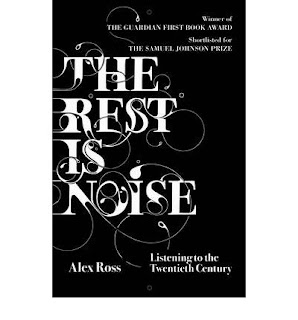
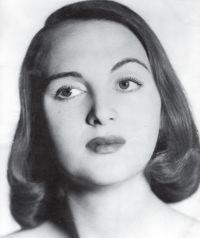
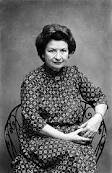

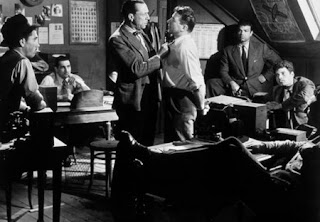

.jpeg)

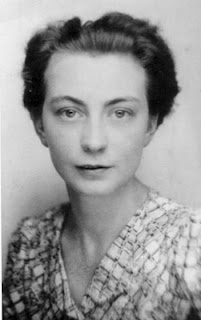
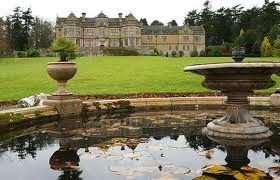
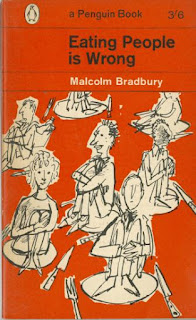
Comments